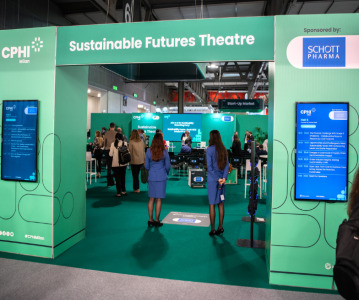What did we learn from Pharmapack 2024? The green edition

Pharmapack Europe, held in Paris each year is a great opportunity to see the latest innovations and trends in pharmaceutical packaging and to hear from the companies and experts in the area on what aspects are most important to them in their products and businesses year on year.
This year we had a particular focus on sustainability at the event, with a dedicated content track, a booth from the Pharma Sustainability Team on the show floor, awards dedicated to sustainability, and many more sustainable initiatives running through the core of the show.
This focus was echoed by many of our exhibitors and attendees at the event, many of whom are leading the way in sustainable action in the pharmaceutical packaging industry.
Exhibitors showcased their own greener products, with companies such as BD Medical, West Pharma, Röchling, Recipharm, Nelipak, and many more using the event to highlight their products and sustainable achievements.
On speaking with our esteemed attendees and exhibitors on my rounds of the show floor, I was able to garner an informative overview of what the industry leaders deem as the most important themes in greener packaging and throughout the pharma value chain.
The importance of collaboration
Partnerships are becoming a key feature of the pharmaceutical industry, something that isn’t missed in sustainability, where companies are recognizing the value of collaboration and learning from others. Consortiums and initiatives are growing in number and size, with giants of the industry clubbing together, pooling resources, and learning how to make a difference together. These collaborations enable further growth in this vein throughout the value chain, and down to the smaller companies that struggle to take the initial steps towards more sustainable processing.
Our exhibitors noted the importance of events such as Pharmapack to provide a platform to establish these partnerships and to encourage them to mature. Many of the exhibitors had meetings set up with other partners to collaborate, and had the opportunity through the Pharmapack Awards, the Innovation Gallery and Innovation Tours to see some new ideas coming into the industry.
Our sustainability focus groups provided some valuable insights from thought leaders on what they want from the industry. Collaboration here really stood out as something they were clammouring for; more spaces for discussions between companies, consultancies, and consortiums to identify the main issues surrounding sustainability in the packaging sector, and what solutions can be offered up. All group members agreed the solutions needed to be actionable – tangible results are what they want to see.
The importance of education
At the event, the theme of education was topical in two way, firstly, from an event content perspective, we held a dedicated track to Sustainability, where we had keynote speakers, presentations and panel discussions on a range of sustainability topics relevant to the pharmaceutical packaging industry. These included ‘Let’s play it green: Realising a Decarbonised Supply Chain in Parenteral Drug Administration’, and ‘Unpacking the Challenges of Circular Drug Delivery and Packaging’. The sustainability track was incredibly popular at the event, showing just how much these topics are valued and how great the thirst for knowledge is here.
Secondly, education in the wider perspective was noted as a key driver to change in the industry. Discussions with Anthesis, Sartorius, and Alliance to Zero highlighted how companies and consumers alike have to be educated in order to change the narrative around a lot of the challenges that the industry face. Namely, in product development, blocks that surface time and time again surround materials, the use of plastic, and recyclability. The experts I spoke with said there is a general consensus whereby when developers come up against such blocks, for example in the use of plastic in primary packaging, rather than searching for a work around, or perhaps focusing on how to remove plastic in secondary and tertiary packaging, they surrender to the idea that it can’t be done. To educate and encourage these developers to find the alternatives and to change the mindset to a more ‘let’s think outside the box’ (in this case a plastic box) attitude is really important in making the first small steps towards industry-wide change.
From a consumer and patient perspective the narrative must also change, or at least develop. How the importance of sustainability to someone at the end of the value chain influences their decision making is an integral consideration for manufacturers. How this importance weighs up against the value people put on their health means that packaging developers might be less motivated to develop sustainable packaging solutions, because they know the consumers will buy the product regardless. If we compare to the food industry, if someone is choosing between two brands of soup, a determining factor might be that one brand uses less packaging, that can then be recycled. In the pharmaceutical industry, if you need to buy paracetamol, the fact that the tablets come in a non-recyclable blister packet is not likely to prevent you from purchasing it.
Education needs to come on both sides of the coin, companies need to know that alternatives are available, they just need to be open to them; and consumers need to know about the impact of the pharmaceutical industry on the environment and demand change through actions that feed down the value chain and effect change.
The importance of regulation
The pharmaceutical and healthcare industry is probably the most heavily regulated industry in the world. Understandably and rightly so. However, there is a lag in bringing up regulation around climate change and sustainable practices and developments in the industry. Some regulation serves as a blocker to the packaging industry – where decades of testing has determined that virgin plastics are most suitable for primary packaging, and deemed the most safe – this also means that companies are less inclined to go through the rigmarole and expense of testing an alternative, greener material for the same purpose.
As the regulations around restricting the use of more carbon emitting materials are lacking, or merely guidelines, this leads to a deficit in motivation for packaging developers to push for the more carbon neutral alternatives or approaches. However, this certainly doesn’t mean that there is no motivation there from the industry, companies, in conjunction with consortiums are lobbying for government action. Progress is being made in this area, with the German Supply Chain Due Diligence Act jumping out as a prime example, but with pharma being a global industry, more than just a few countries have to raise the bar.
All in all, it was brilliant to see the passion and urgency with which everyone at Pharmapack spoke about sustainability in the industry and by next year’s event I am sure we’ll have seen encouraging progress in the field.
See our thoughts on sustainability from CPHI Barcelona 2023 in this infographic, and more about sustianability at Pharmapack by clicking the button below.
Related News
-
News Pfizer may shift production back to US under Trump pharma tariffs
At the 45th TD Cowen annual healthcare conference in Boston, USA, Pfizer CEO Albert Bourla outlined the potential for Pfizer to shift its overseas drug manufacturing back to the US as pharmaceutical industry players weigh their options against Presiden... -
News Women in Pharma: Connecting accessible pharma packaging to patients – a Pharmapack Special
Throughout our Women in Pharma series, we aim to highlight how CPHI events encourage discussions around diversity, equity, and inclusion initiatives in the pharmaceutical industry. -
News CPHI Podcast Series: Packaging expert perspectives at Pharmapack 2025
This month's podcast episode sounds a little different, covering the latest event in Paris – Pharmapack 2025. Digital Editor Lucy Chard speaks to several experts direct from the floor of the show, bringing you right in on the action.&nbs... -
News Closing 2024 with Editors' picks of top articles from the past year
Coming to the end of 2024 and it’s certainly been a busy year, for CPHI and for the rest of the pharmaceutical and healthcare industry. Topics of conversation throughout the last 12 months have been varied, touching on the technical, to the polit... -
News SCHOTT Pharma’s sustainable journey with CPHI
Sustainability is of paramount importance in the pharmaceutical industry. See how a recent partnership between CPHI and SCHOTT Pharma has helped to highlight and accelerate their sustainability journey to reach global goals. -
News CPHI Podcast Series: Investing in a vision for the future of life sciences
In this episode Lucy Chard is joined by Rajiv Khatau to discuss the importance of looking into new therapeutic areas and some of the more niche areas of pharmaceuticals, and investing in the future of the industry. -
News Lessons from CPHI Milan 2024: Sunny Intervals for Pharma Manufacturing?
As the 2024 CPHI conference wrapped up in Milan, we caught up with L.E.K. Consulting – a global strategy consulting firm with deep expertise in pharma manufacturing – to discuss evolving market perspectives and business outlook. -
News Women in Pharma: Reflections from Behind the Scenes
In this instalment of our monthly series, the team that brings you the Women in Pharma series each month sits down for a heart-to-heart on what the series means to them, and how they hope to continue their work in the future.
Recently Visited
Position your company at the heart of the global Pharma industry with a CPHI Online membership
-
Your products and solutions visible to thousands of visitors within the largest Pharma marketplace
-
Generate high-quality, engaged leads for your business, all year round
-
Promote your business as the industry’s thought-leader by hosting your reports, brochures and videos within your profile
-
Your company’s profile boosted at all participating CPHI events
-
An easy-to-use platform with a detailed dashboard showing your leads and performance








